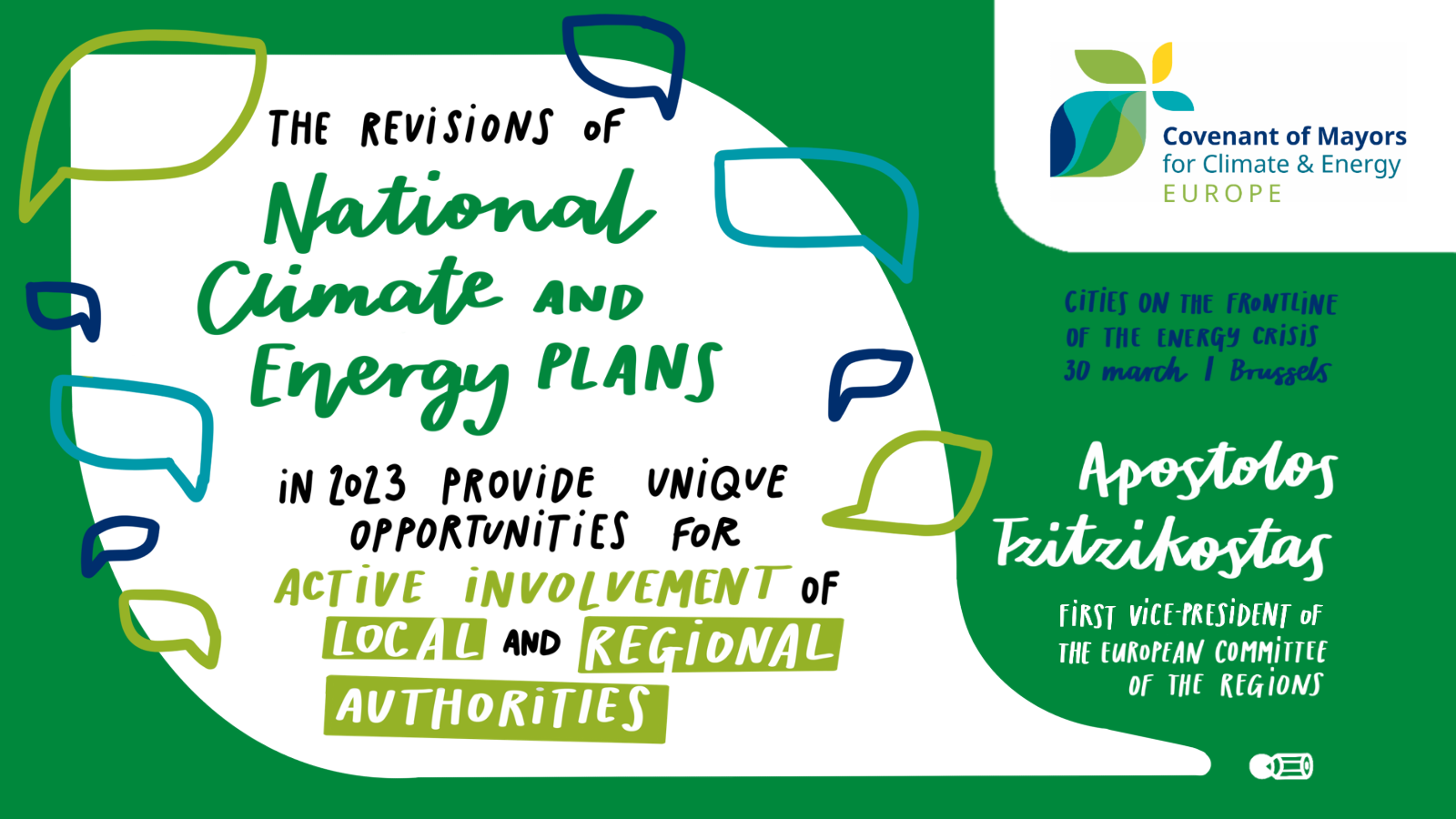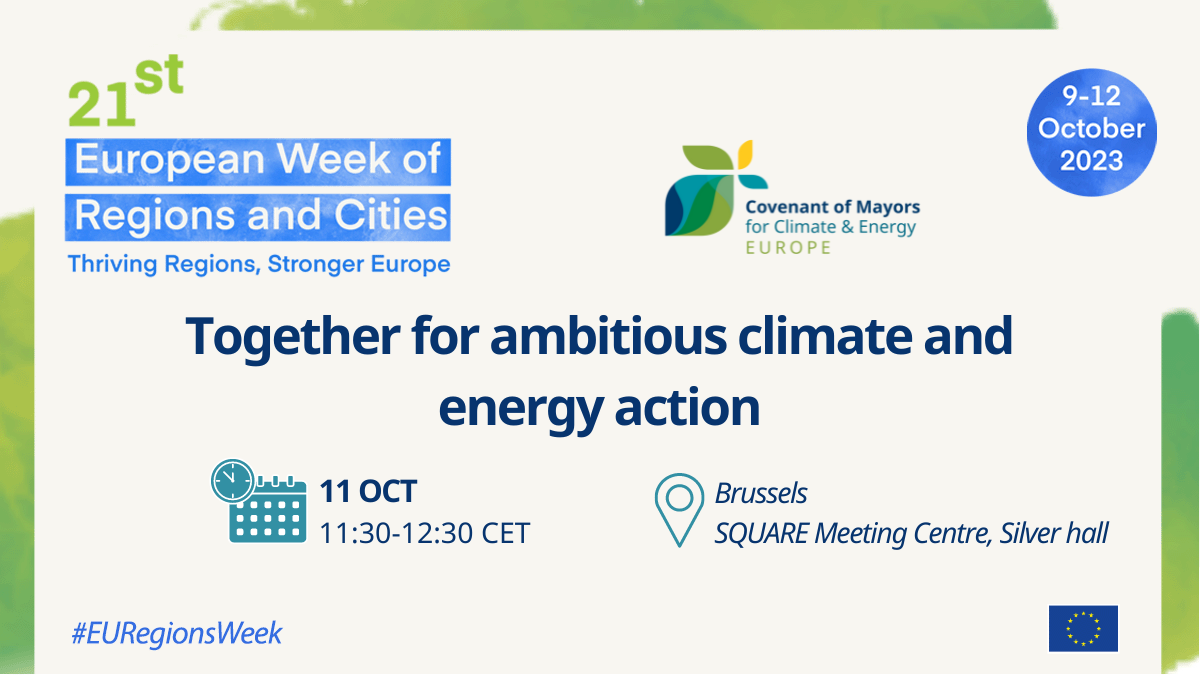
Achieving the European Union's ambitious climate neutrality goal by 2050 requires active involvement from each Member State. To facilitate this collective effort, each nation outlines its plan of action to reach EU targets through a National Energy and Climate Plan (NECP). Initially submitted in 2020, these plans are currently undergoing crucial revisions.
Here’s a few reasons why these updates matter and why they represent a pivotal opportunity for cities.
Why it matters for cities?
As promoters of local-level energy and climate action, we are following closely how national governments are involving and accounting for cities in their national plans.
One thing is clear: without cities, national governments will not reach the EU’s targets. Not only do cities represent approximately 70% of emissions in Europe, but they also are a driving force of change, innovation and leadership when it comes to climate action. Moreover, effective climate and energy action requires bringing together and activating a wide range of stakeholders and all levels of government, especially considering that the local level has a unique capacity to mobilise local communities. If this is not reflected in the countries’ NECPs, the plans will be difficult to implement.

How are cities involved?
So far, 13 of the 27 Member States have already submitted the first draft of their revised NECPs. As the Commission revises these plans, they will not only be looking at the content of the plans, but also how they were developed and who they involved. For some countries, the NECP process has been embraced as an opportunity to create a space for dialogues between different levels of government.
More than an opportunity, it's also an obligation. As part of the NECP process, the Commission mandated (via Article 11 of the Governance Regulation) that Member States set up dialogues between different levels of government, as well as with relevant stakeholders, on topics of energy and climate. The revision of the plans is a good time to look at how Member States are responding to this obligation.
For that, it’s important to look at the quality of the dialogues put in place. For national plans to really reflect the voice of local governments, national governments need to go beyond organising sporadic, one-off, top-down consultations, which was the approach of most Member States when developing their NECPs the first time, in response to the Article 11.
Through the EU LIFE-funded project NECPlatform, multilevel dialogue platforms are being set up in 6 countries: Bulgaria, Croatia, France, Italy, Portugal and Romania. The project is paying special attention to the way these dialogues are organised. Dialogues are taking place every few months during the revision process of the NECPs. The intention on the long run is for these dialogues to turn into permanent platforms that will live beyond the current NECP revision. Such platforms would then become a privileged forum to discuss national energy and climate policies more generally.
Following the example, the Covenant of Mayors has also supported multilevel dialogues in other countries, in Latvia, Slovenia and Malta in the past few months, with the help of our Covenant coordinators and supporters.
“We want to involve municipalities in the NECP revision process. If we don’t work together, we risk that the objectives might not be achieved. Public transport, energy efficiency, decarbonising heating systems or using waste heat are some of the matters which need close collaboration.” - Andrej Gnezda, Director, Directorate for Climate Policies, Ministry of Environment, Climate and Energy in Slovenia.
In Slovenia, for instance, as in many of the other countries where dialogues were held, these exchanges were the chance for municipalities to shed light on legislative challenges, the necessity for transparent and timely funding information for local projects aligned with the NECP, and the difficulties stemming from a lack of staff and expertise.
How are cities considered?
Engaging local governments in the NECP process is just an initial step towards integrating cities' contributions into national long-term climate strategies. The expectation is that these dialogues will encourage national governments to overtly acknowledge the efforts of cities in their plans, as well as detail how they will actively support and facilitate them.
For over a decade now, local governments have been at the forefront of the EU's climate ambitions via the Covenant of Mayors. Inaugurated in 2008, this initiative showcased their early dedication and proactive stance at a time when national governments were only beginning to acknowledge climate change. The Covenant of Mayors has established an essential framework through Sustainable Energy and Action Plans (SECAPs), developed by thousands of cities across Europe, turning political commitment into concrete action.
However, in the first version of NECPs, the action plans of signatories of the Covenant of Mayors across Europe were not capitalised on enough. Only 10 of the 24 EU Member States mentioned the Covenant of Mayors in the first versions of the NECPs, submitted in 2020.
So far, of the thirteen countries who have submitted their draft updated NECPs, only half have mentioned the Covenant of Mayors: Croatia, Estonia, Cyprus, Italy, Lithuania, Luxembourg and Portugal.
Of these, three countries – Italy, Croatia and Portugal – proposed specific measures in their NECP aimed at strengthening SECAPs and local action. Croatia, for instance, intends to help improve strategic planning at local level by helping Covenant signatories with their SECAPs, monitoring their progress and the implementation through a national programme, and using data from the SECAPs in each subsequent revision of their national plan.
If we consider SECAPs as local counterpart to the national governments’ NECPs, it’s only logical that the two plans align and feed into one another. As Croatia’s plan outlines, NECPs should integrate the data from the local plans and leverage the monitoring and reporting of emissions locally, as well as detail how the national government plans to facilitate implementation at local level.
You want to find out more on how the Covenant of Mayors strengthens cooperation between different levels of government across Europe?
Join our Session at the European Week of Regions & Cities on October 11th 2023, “Covenant of Mayors: together for ambitious climate and energy action”.
Find out more and register now!

Details
- Publication date
- 30 August 2023
